
The Occult Meaning of Beyoncé’s “Lemonade”
Beyoncé’s visual album Lemonade wooed critics with a rich tapestry of sounds and images. There is, however, a deeper level of interpretation that most critics did not consider – one that heavily draws on occult ritual and symbolism. We’ll look at the hidden meaning of Beyoncé’s Lemonade.
The surprise release of Lemonade prompted a perfect storm of media attention. From gossip sites asking “Is Beyoncé accusing Jay-Z of cheating?” to music critics proclaiming Beyoncé a “singular genius” and “Black woman superhero”, Lemonade got plenty of the pop culture spotlight. However, amidst all of that talk, almost nobody has addressed an obvious trait of that visual album: It is heavily occult, spiritual, and ritualistic, and it alludes to metaphysical concepts that gives the story a deeper meaning.
Indeed, most observers kept their analysis in very shallow waters, reaching pandering conclusions such as “it’s about strong Black women and non-Black women should not even attempt to understand it”, without even addressing the 50% of the video that goes way beyond that simplistic premise.
The album is described on Tidal as “every woman’s journey of self-knowledge and healing” and the overall the theme is said to be “the empowerment of black women referencing both marital relationships and the historical trauma from slavery”. However, the occult imagery of the video tells a story that is far more complex … and far less “empowering”. While throughout the video, Beyoncé appears to be speaking to an unfaithful husband, various clues indicate this unfaithful husband is not Jay-Z or her father; instead, it is Beyoncé’s true father and husband, the occult elite’s music industry. After giving her life and soul to be part of this industry, Beyoncé is now married to it – for better or for worse. But the industry is not faithful to her and treats her badly. Through symbolic imagery,
Lemonade explains what was required from Beyoncé to become, in her words, the “baddest b*tch in the game”, how it left a permanent mark on her, and how she will now be used to be a “leader”.
Written and Directed by the Occult Elite
Music critics claim that
Lemonade is Beyoncé’s most personal album, making it seem like she sat there crying with a pen and paper, writing her heart out. But that is not how it went down. A quick look at the album’s liner notes reveal that the album was written by a team of
72 writers … the song
Hold Up alone was written by 15 people! The video part of the “visual album” was put together by seven directors, including some of the occult elite’s favorites: Jonas Akerlund and Mark Romanek. Akerlund alone has been mentioned several times on Vigilant Citizen due to the fact that he created highly symbolic videos such as Britney Spear’s
Hold it Against Me, Lady Gaga’s
Telephone, an
MK-ultra themed commercial for Versace, and many more.
Akerlund has a clear grasp of the occult elite’s imagery and seems to specialize in depicting pop stars as mind-controlled puppets.

In Hold it Against Me, Britney is trapped inside a room full of monitors and attached to intravenous lines. In short, a MK slave.

In Telephone, Akerlund had Lady Gaga and Beyoncé doing the One-Eye sign after killing a bunch of people in an all-American diner.

In his Versace For H&M promo video, models are depicted as MK puppets controlled by a ruthless handler: Donatella Versace.
In
Lemonade, the same ideas are communicated – but insidiously hidden under a thick layer of “strong Black woman” narrative. Beyoncé was always an industry puppet, but now that puppet has been sent back to its “people” to become a leader. In other words, she is (still) Maria from the movie
Metropolis (the elite’s favorite movie).

In Metropolis, Maria is a trusted leader of the working class. The elite kidnaps her and creates an android that takes Maria’s likeness. That android is sent back to the workers in order to mislead them and push them to fall into the elite’s trap. In this screenshot, the android (before it took on Maria’s likeness) stands before an inverted pentagram, hinting that the people that control her are all about occult ritual and black magick.

Beyoncé as Maria from Metropolis at the BET Awards in 2009. The elite told you a long time ago what she’s truly about.
Did Beyoncé do a 180 for
Lemonade and suddenly become about “empowering her people”? Not really. The same occult elite still owns her person, as well as her image and all of her material.
Think about the immediate response following the release of
Lemonade: Accusations, finger-pointing and suspicion towards Jay-Z, her father, and a witch hunt against women who are suspected to be Jay-Z’s mistresses. Is this truly “empowering” anyone … or is it about more self-destruction? Let’s look at
Lemonade.
Lemonade
The hour-long visual album is a tapestry of song clips, poetry passages, and video shorts put together to tell an overarching story. Strongly inspired by Beyoncé’s parents’ native states (Louisiana and Texas), the imagery of
Lemonade (and even its title) taps into the roots of the Deep South. However, it also taps into the roots of occultism.
The entire video is permeated with the concept of duality, which is expressed with the opposition of black and white, good and evil, love and hate. Also, the video depicts two distinct realities: What happens above ground (for the world to see) and what happens underground (after all, the world “occult” means hidden).
Married to the Game
The first poem of the video sets the table: It simultaneously calls out an unfaithful husband and an unfaithful father, in words that can also be applied to the music industry – the “home” where she has spent most of her life – and the real “cheating husband” to whom she is married.
I tried to make a home out of you, but doors lead to trap doors, a stairway leads to nothing. Unknown women wander the hallways at night. Where do you go when you go quiet?
You remind me of my father, a magician … able to exist in two places at once. In the tradition of men in my blood, you come home at 3 a.m. and lie to me. What are you hiding?
The past and the future merge to meet us here. What luck. What a f*cking curse.
The industry is full of “trap doors” and “stairways that lead to nothing” for artists who will forever remain pawns. The occult elite, bent on ritual and black magick reminds her of her father, a “magician”. In her words, “what a f*cking curse.”
The video then proceeds to retell, in symbolic terms, Beyoncé’s first contact with the “dark side”.

Dressed in black, Beyoncé commits suicide … self-sacrifice.

Beyoncé ends up in a room underwater. We see her old self see her new self.
The underwater room represents the womb. While underwater, Beyoncé is in a formative and transitional period until she is ready for rebirth. The poem recited by Beyoncé alludes to the periods of purification required by occult initiates before they experience initiation.
I tried to change. Closed my mouth more, tried to be softer, prettier, less awake. Fasted for 60 days, wore white, abstained from mirrors, abstained from sex, slowly did not speak another word. In that time, my hair, I grew past my ankles. I slept on a mat on the floor. I swallowed a sword. I levitated. Went to the basement, confessed my sins, and was baptized in a river. I got on my knees and said ‘amen’ and said ‘I mean.’
Midway into that poem, things get increasingly darker and Beyoncé gets increasingly agitated, jerking around as if possessed. From purification, it becomes about black magick.
I whipped my own back and asked for dominion at your feet. I threw myself into a volcano. I drank the blood and drank the wine. I sat alone and begged and bent at the waist for God. I crossed myself and thought I saw the devil. I grew thickened skin on my feet, I bathed in bleach, and plugged my menses with pages from the holy book, but still inside me, coiled deep, was the need to know … Are you cheating on me?

After she thought she “saw the devil”, Beyoncé says she “bathed in bleach” and “plugged her menses with pages of the Holy Book”. Initiation.
Soiling, disgracing and destroying Christian artifacts (especially the Bible) is a standard part of satanic ritual. Occultists have always considered menstrual blood to be potent and charged with “life force”, which is why it is often used in occult rituals. This particular verse is therefore a clear reference to black magick. It is an initiatory oath towards the dark side.
Rebirth
After a gestation period inside the womb, where Beyonce was initiated in the ways of the occult elite, she is ready for rebirth.

Beyoncé emerges from a temple as water gushes out the same way a baby emerges from the womb after the water breaks.
In this sequence, Beyoncé is also an embodiment of the goddess Oshun of the Yoruba people.
Oshun is commonly called the river orisha, or goddess, in the Yoruba religion and is typically associated with water, purity, fertility, love, and sensuality. She is considered one of the most powerful of all orishas, and, like other gods, she possesses human attributes such as vanity, jealousy, and spite.
Beyoncé’s dress color is also associated with Oshun as she is associated yellow or amber and the metal gold or bronze.

A classic depicting of Oshun.
After death by self-sacrifice, a period of seclusion and occult initiation, Beyoncé is reborn. She the occult elite’s minion now. She looks sexy and fabulous and she is let loose on her community. Does she do good and help people? Not really. She actually does the exact opposite.

Beyoncé walks in the streets of New Orleans and starts breaking cars with a baseball bat. She’s not only breaking the car of her cheating husband – she’s breaking everybody’s cars.
At one point Beyoncé sees a beauty spa that offers “Free facials today”. She breaks its window. Sexual innuendo aside, considering that this type of business is nearly always owned by local small business owners and in context of her other destruction, one can ask: Why is Beyoncé attacking her own community?
This video might represent the “meltdown” phase many industry slaves go through after being re-programmed by the industry.

Industry slave Britney Spears attacking a car during her infamous breakdown of 2008.

Despite knowing that that the images from this CCTV camera will go directly to the New Orleans Police department (and most likely the media as did her well-publicized real-life CCTV experience), Beyoncé attacks it. She is aware of her actions.
Then, Beyoncé gets inside a monster truck and crushes a bunch of people’s cars. Take that Beyoncé’s home town!
After that public meltdown, Beyoncé pleads with the elite. Broken by the programming, she is ready to be built up … in the elite’s image.
If it’s what you truly want … I can wear her skin over mine. Her hair over mine. Her hands as gloves. Her teeth as confetti. Her scalp, a cap. Her sternum, my bedazzled cane. We can pose for a photograph, all three of us. Immortalized … you and your perfect girl.
In Monarch mind control terms, Beyoncé is ready to take on her alter persona and to become the pop star the elite wants to put in front of the masses. Fierce!
Exploitation
After a couple of angry songs where Beyoncé rebels against her cheating husband, things get ritualistic again. While, above ground, Beyoncé appears to be a strong, unapologetic woman, things are different underground.

Dressed in red (color of sacrifice) and surrounded by fire, another ritual takes place – sex magick.
Beyoncé then recites a poem charged with occult meaning: It is about sex magick.
She sleeps all day. Dreams of you in both worlds. Tills the blood, in and out of uterus. Wakes up smelling of zinc, grief sedated by orgasm, orgasm heightened by grief. God was in the room when the man said to the woman, “I love you so much. Wrap your legs around me. Pull me in, pull me in, pull me in.” Sometimes when he’d have her nipple in his mouth, she’d whisper, “Oh, my God.” That, too, is a form of worship.
Sex magick can be defined as “sexual activity used in magical, ritualistic or otherwise religious and spiritual pursuits”. Not unlike the menstrual blood mentioned above, physical arousal is considered by occultists to be extremely potent and can be channeled for magickal purposes (see
Aleister Crowley and the O.T.O).
The rest of the poem invokes darkness and the lore of witchcraft. It again references images associated with black magick.
Her hips grind, pestle and mortar, cinnamon and cloves. Whenever he pulls out … loss. Dear moon, we blame you for floods … for the flush of blood … for men who are also wolves. We blame for the night, for the dark, for the ghosts.
In this context, Beyoncé is a programmed slave used in magick ritual – a Beta Kitten. Appropriately enough, the next song,
6 Inch, is about prostitution – what Beta Kittens do.
Six-inch heels, she walked in the club like nobody’s business
Goddamn, she murdered everybody and I was her witness
She works for the money, she work for the money
From the start to the finish
And she worth every dollar, she worth every dollar
And she worth every minute
In the poem that follows, Beyoncé addresses her mother, while denouncing abusive husbands and fathers. Also, she is referring to the occult industry that became her father and her husband.
Mother dearest, let me inherit the earth. Teach me how to make him beg. Let me make up for the years he made you wait. Did he bend your reflection? Did he make you forget your own name? Did he convince you he was a god? Did you get on your knees daily? Do his eyes close like doors? Are you a slave to the back of his head?
Am I talking about your husband or your father?
The words above describe mental, physical and sexual abuse, the kind that MK slaves go through. After reciting these horrible words, Beyoncé sings a song dedicated to her father. One cannot say that
Lemonade is kind to Black male figures.
Reformation
After anger and rebellion, Beyoncé settles down, accepts her fate and wants to reconcile.
Baptize me … now that reconciliation is possible. If we’re gonna heal, let it be glorious. 1,000 girls raise their arms. Do you remember being born? Are you thankful for the hips that cracked? The deep velvet of your mother and her mother and her mother? There is a curse that will be broken.

After a period of tribulation, Beyoncé (and her followers) are ready to be renewed. By depicting a baptism, the video hints that this is not about Jay-Z, it is about something bigger.
The song
Sandcastles features Beyoncé and Jay-Z sharing intimate moments. Jay-Z is the bad guy that Beyoncé forgave.

Why would Jay-Z even agree to appear in such a video? 1) He has to. 2) All publicity is good publicity. 3) This is not really about him, he is simply a proxy to the true subject of the video.
Afterwards, the video focuses on a few regular, everyday, Black people. One of them goes on to praise the Lord.

“Thank you, Jesus. I just love the Lord, I’m sorry, brother. I love the Lord. That’s all I got. When your back gets against the wall and your wall against your back, who you call? Hey! Who you call? Who you call? You gotta call Him. You gotta call Jesus. You gotta call Him. You gotta call Him ’cause you ain’t got another hope.¨”
However, things are different underground. Beyoncé is not like this woman standing outside. She is inside a dark, cavernous place – and her mind is somewhere else.
You are terrifying … and strange and beautiful.
Magic.
She is still obsessed by the dark side, and probably always will be. Despite this fact, or because of it, she has now been chosen to lead her people.
Freedom
From there on out, the theme of freedom and liberation takes over. In a system that is tightly controlled by the powers that be, “liberation” can only be championed by the pawns those powers have created. In other words: controlled opposition.

During the song Forward, portraits of Black men killed at the hands of police are held by their mothers.
Like Maria from Metropolis, Beyoncé was sent by “them” to become a leader. Her team of 72 writers and seven video directors decided to co-opt this issue to give her credibility and legitimacy.
Beyoncé then moves on to praise her grandmother for metaphorically turning the lemons of life into lemonade – not without using occult terms, of course.
Grandmother, the alchemist, you spun gold out of this hard life, conjured beauty from the things left behind. Found healing where it did not live. Discovered the antidote in your own kit. Broke the curse with your own two hands. You passed these instructions down to your daughter who then passed it down to her daughter.
While these words invoke hope and strength, Beyoncé’s final words are about pleading “the magician” (the occult elite) to bring her back together. She is not free or liberated from anything. In her own words, “her torturers became her remedy”.
True love brought salvation back into me. With every tear came redemption and my torturers became my remedy. So we’re gonna heal. We’re gonna start again. You’ve brought the orchestra, synchronized swimmers.
You’re the magician. Pull me back together again, the way you cut me in half. Make the woman in doubt disappear. Pull the sorrow from between my legs like silk. Knot after knot after knot. The audience applauds … but we can’t hear them.
Ending Credits
The album ends with the song
Formation – a widely publicized single that got airplay at the biggest televised event on Earth: the Superbowl Halftime show. The song begins with Beyoncé basically saying “You guys, stop saying that I am Illuminati! I am rebellious super Black Power girl now.”
Y’all haters corny with that Illuminati mess
Paparazzi, catch my fly, and my cocky fresh
I’m so reckless when I rock my Givenchy dress (stylin’)
I’m so possessive so I rock his Roc necklaces
So, after calling people corny because SHE’s been pushing the Illuminati Agenda, she goes on to claim that she wears Givenchy and wears Rocafella necklaces. Maybe one should point out that Rocafella Records was named after the Rockerfeller family (the primary occult elite family in the USA) and that the label’s handsign is this:

Beyoncé … you’re still corny with that Illuminati mess.
In Conclusion
Beyoncé’s
Lemonade is dark, complex, profound, and works on several levels. However, it is
not a “personal” album. It was composed by 72 writers and the “visual album” was produced by a team of occult-friendly video directors. It is a carefully crafted product of the music industry that contains the same messages other pop products. However, in 2016, the cultural context is shifting. The police killings of Black people in the past years has caused grief, unrest and racial division across the USA. Always remaining “relevant”, Beyoncé’s team has crafted a plot that taps directly into these issues, while cleverly weaving throughout the occult elite’s own imagery and agenda.
While
Lemonade appears to be about empowerment and freedom, the occult “underground” imagery depicts Beyoncé as exactly the opposite: a slave who goes through the rigorous initiation process of the elite. She is not a rebel. She is Maria from Metropolis. And she is not serving you lemonade … she is serving you the elite’s toxic Kool-Aid.
beyonce
TRADUCIDO GOOGLE:
Álbum de Beyoncé visual limonada cortejó a los
críticos con una rica variedad de sonidos e imágenes. Hay, sin embargo, un
nivel más profundo de la interpretación que la mayoría de los críticos no
tuvieron en cuenta - que en gran medida se basa en el ritual y el simbolismo
oculto. Veremos el significado oculto de la limonada de Beyoncé.
El lanzamiento sorpresa de limonada provocó una
tormenta perfecta de la atención de los medios. Desde sitios de chismes
preguntando "¿Está Beyoncé acusa a Jay-Z de hacer trampa?" A los
críticos de música Beyoncé proclamando un "genio singular" y
"mujer Negro superhéroe", limonada tiene un montón de la
atención de la cultura pop. Sin embargo, en medio de toda esa charla, casi
nadie se ha ocupado de un rasgo evidente de ese álbum visual: Es en gran medida
oculto, espiritual y ritual, y se alude a conceptos metafísicos que da a la
historia un significado más profundo.
De hecho, la mayoría de los observadores mantuvieron su análisis
en aguas muy poco profundas, llegando a hacerle el juego conclusiones tales
como "se trata de una fuerte mujeres negras y mujeres no negras ni
siquiera deben intentar entenderlo", sin ni siquiera tratar el 50% del
vídeo que va mucho más allá esa premisa simplista.
El álbum se describe en la marea como "el viaje de cada
mujer de auto-conocimiento y la curación" y el general el tema se dice que
es "la potenciación de las mujeres negras que hacen referencia tanto a las
relaciones de pareja y el trauma histórico de la esclavitud". Sin
embargo, la imagen oculta del video cuenta una historia que es mucho más
compleja ... y mucho menos "potenciar".Mientras que todo el video,
Beyoncé parece estar hablando a un marido infiel, varias pistas indican que
esto no es infiel marido Jay-Z o su padre; en cambio, es verdadero padre y
el marido de Beyoncé, la industria musical de la élite oculta. Después de
dar su vida y alma a ser parte de esta industria, Beyoncé está ahora casado con
ella - para bien o para mal. Pero la industria no es fiel a ella y la
trata mal. A través de imágenes simbólicas, limonada explica lo
que se requería de Beyoncé para convertirse, en sus palabras, la "tch más
malo b * en el juego", la forma en que dejó una marca permanente en ella,
y la forma en que ahora se utiliza para ser un "líder ".
Escrita y dirigida por el Elite
Oculta
Los críticos musicales afirman que la
limonada es el álbum más personal de Beyoncé, para hacer parecer que
estaba allí sentada llorando con un lápiz y papel, escribiendo su corazón. Pero
eso no es la forma en que se puso. Un rápido vistazo a notas del álbum
revelan que el álbum fue escrito por un equipo de 72escritores ... la
canción Hold Up solo fue escrito por 15 personas! La parte de
vídeo del "álbum visual" se puso toghter por 7 directores, entre
ellos algunos de favorito de la élite oculta: Jonas Akerlund y Mark Romanek. Akerlund
solo ha sido mencionado varias veces en Vigilant Citizen debido al hecho de que
él creó vídeos altamente simbólicos como de Britney Spears Hold It Against Me , de Lady Gaga teléfono , un comercial de temática MK ultra- para Versace, y muchos
más.
Akerlund tiene una clara comprensión
de las imágenes de la élite oculta y parece especializarse en la representación
de las estrellas del pop como marionetas controladas por la mente.
En Hold It Against Me, Britney está
atrapado dentro de una sala llena de monitores y unido a las vías intravenosas. En
resumen, un esclavo MK.
En Teléfono, Akerlund tenía Lady
Gaga y Beyoncé hace la muestra Tuerto después de matar a un grupo de personas
en una cena de todos los estadounidenses.
En su Versace para H & M vídeo
promocional, los modelos son presentados como marionetas MK controlados por un
controlador implacable: Donatella Versace.
En la limonada, las mismas
ideas se comunican - pero insidiosamente ocultos bajo una espesa capa de
narrativa "mujer fuerte Negro". Beyoncé fue siempre un títere de
la industria, pero ahora que la marioneta ha sido enviado de vuelta a su
"gente" para convertirse en un líder. En otras palabras, ella es
(todavía) Maria de la película Metrópolis (película
favorita de la élite).
En Metrópolis, María es un líder de
confianza de la clase obrera. La élite la secuestra y crea un androide que
se lleva a semejanza de María. Androide que se envía de nuevo a los
trabajadores con el fin de inducir a error e impulsarlos a caer en la trampa de
la élite. En esta pantalla, el androide (antes de que asumió la semejanza
de María) se encuentra ante un pentagrama invertido, dando a entender que las
personas que la controlan son todos acerca de ritual oculto y la magia negro.
Beyoncé como María de Metropolis de
los premios BET en 2009. La élite se dijo hace lo que es realmente acerca de un
largo tiempo.
Beyoncé hizo hacer un 180 para la
limonada y se convierten de repente sobre "que autoriza su
gente"? Realmente no. La misma élite oculta todavía posee su
persona, así como su imagen y todo su material.
Piense en la respuesta inmediata
tras la publicación de la limonada: Unccusations, acusaciones y sospechas
hacia Jay-Z, su padre, y una caza de brujas contra las mujeres que son
sospechosos de ser amantes de Jay-Z. ¿Es esto realmente
"potenciar" a nadie ... o es algo más autodestrucción? Veamos la
limonada.
limonada
El álbum visual de una hora es un
tapiz de clips de canciones, pasajes de poesía, y pantalones cortos de vídeo
juntos para contar una historia general.Fuertemente inspirado por los estados
nativos 'de Beyoncé padres (Luisiana y Texas), la imagen de la limonada (e
incluso su nombre) se nutre de las raíces del sur profundo. Sin embargo,
también se nutre de las raíces del ocultismo.
el vídeo entero está impregnado con
el concepto de la dualidad, que se expresa con la oposición de blanco y negro,
el bien y el mal, el amor y el odio. Además, el video muestra dos
realidades distintas: ¿Qué pasa por encima del suelo (para que el mundo vea) y
lo que sucede bajo tierra (después de todo, el mundo "oculta"
significa oculto).
Casado con el Juego
El primer poema del video pone la
mesa: Se llama simultáneamente un marido infiel y un padre infiel, con palabras
que también se puede aplicar a la industria de la música - la "casa"
donde ha pasado la mayor parte de su vida - y lo real "marido de
engaño" a la que se casa.
Traté de hacer una casa fuera de
usted, pero puertas conducen a puertas trampa, una escalera conduce a nada. mujeres
desconocidas vagan los pasillos por la noche. ¿Dónde ir cuando vaya
tranquila?
Me recuerda a mi padre, un mago ...
capaces de existir en dos lugares a la vez. En la tradición de los hombres
en mi sangre, llega a casa a las 3 de la mañana y me mientas. ¿Qué estás
escondiendo?
El pasado y el futuro se unen para
reunirse con nosotros aquí. Que suerte. ¿Qué maldición af * cking.
La industria está llena de
"puertas trampa" y "escaleras que conducen a la nada" para
los artistas que siempre permanecerán peones. La élite oculta, empeñado en
la magia ritual y el negro le recuerda a su padre, un "mago". En
sus palabras, "lo af * cking maldición."
El vídeo a continuación procede a
contar de nuevo, en términos simbólicos, el primer contacto de Beyoncé con el
"lado oscuro".
Vestido de negro, Beyoncé se suicida
... auto-sacrificio.
Beyoncé acaba en un submarino de la
habitación. Vemos la misma de ver su nuevo auto.
La sala bajo el agua representa el
vientre. Si bien bajo el agua, Beyoncé se encuentra en un período de
formación y de transición hasta que esté lista para el renacimiento. El
poema recitado por Beyoncé alude a los períodos de purificación requeridos por
los iniciados ocultos antes de que experimenten la iniciación.
He intentado cambiar. Cerré la
boca más, trató de ser más suave, más bonita, menos despierto. Ayunado
durante 60 días, se vistieron de blanco, se abstuvo de espejos, se abstuvieron
de tener relaciones sexuales, poco a poco no hablaba una palabra más. En
ese momento, mi pelo, que creció más allá de mis tobillos. Dormí en una
estera en el suelo. Tragué una espada. Me levité. Fuimos al
sótano, confesado mis pecados, y fue bautizado en un río. Me puse de
rodillas y dije 'Amén' y dije 'quiero decir.
A medio camino en ese poema, las
cosas se ponen cada vez más oscuro y Beyoncé cada vez se siente agitado,
sacudiendo su alrededor como si estuviera poseído. A partir de la
purificación, se hace sobre la magia negro.
Saqué mi propia espalda y le
preguntó por el dominio en sus pies. Me tiré en un volcán. Bebí la
sangre y bebía el vino. Me sentaba solo y rogué y doblada en la cintura
para Dios. Crucé mí y pareció ver al diablo.Crecí engrosamiento de la piel
en los pies, me bañé en lejía, y conecté mi menstruación con las páginas del
libro sagrado, pero aún dentro de mí, en espiral profunda, fue la necesidad de
saber ... ¿Estás engañando a mí?
Después pensó que "vio al
diablo", Beyoncé dice que "bañado en lejía" y "enchufado su
menstruación con las páginas del libro sagrado". Iniciación.
Suciedad, deshonrar y la destrucción
de artefactos cristianos (especialmente la Biblia) es una parte estándar de
ritual satánico. Ocultistas siempre han considerado la sangre menstrual
que ser potente y acusado de "fuerza de vida", que es por eso que se
utiliza a menudo en rituales ocultos. Por tanto, este verso en particular
es una clara referencia a la magia negro. Es un juramento de iniciación
hacia el lado oscuro.
Renacimiento
Después de un período de gestación
en el útero, donde Beyoncé se inició en los caminos de la élite oculta, ella
está lista para el renacimiento.
Beyoncé se desprende de un templo
como el agua brota de la misma manera un bebé emerge del útero después de los
saltos de agua.
Después de la muerte por la
auto-sacrificio, un período de reclusión y la iniciación oculta, Beyoncé vuelve
a nacer. Ella peón de la élite oculta ahora. Ella se ve sexy y
fabulosa y ella se soltó en su comunidad. A qué se dedica la gente buena y
ayuda? Realmente no. De hecho, ella hace todo lo contrario.
Beyoncé camina en las calles de
Nueva Orleans y comienza coches rompiendo con un bate de béisbol. No ha
sido sólo romper el coche de su marido infiel - que está rompiendo los coches
de todo el mundo.
En un momento Beyoncé ve un salón de
belleza que ofrece tratamientos faciales "gratis hoy mismo". Ella
rompe su ventana. insinuaciones sexuales a un lado, teniendo en cuenta que
este tipo de negocio es casi siempre propiedad de los propietarios de pequeñas
empresas locales y en el contexto de su otra destrucción, uno puede
preguntarse: ¿Por qué se Beyoncé atacando su propia comunidad?
Este video podría representar la
fase de "crisis" muchos esclavos de la industria pasan por después de
haber sido re-programado por la industria.
esclavo industria de Britney Spears
atacar un coche durante su infame ruptura de 2008.
A pesar de saber que los que las
imágenes de esta cámara CCTV irán directamente al departamento de policía de Nueva
Orleans (y muy probablemente los medios de comunicación como su experiencia
hizo circuito cerrado de televisión en la vida real publicitado), Beyoncé
ataca. Ella es consciente de sus actos.
Entonces, Beyoncé se mete dentro de
un camión monstruo y aplasta un montón de coches de las personas. Tome esa
ciudad natal de Beyoncé!
Después de que la crisis pública,
Beyoncé suplica a la élite. Roto por la programación, que está listo para
ser construido ... a la imagen de la élite.
Si se trata de lo que realmente
quieres ... puedo usar su piel sobre la mía. Su cabello sobre la mía. Sus
manos como guantes. Sus dientes como confeti. Su cuero cabelludo, una
gorra. El esternón, mi bastón deslumbrado. Podemos posar para una
fotografía, los tres de nosotros.Inmortalizado ... usted y su chica perfecta.
En términos de control mental
monarca, Beyoncé está listo para asumir su personaje alter y convertirse en la
estrella del pop la élite quiere poner delante de las masas. ¡Feroz!
Explotación
Después de un par de canciones de
ira donde los rebeldes de Beyoncé en contra de su marido infiel, las cosas se
ponen ritual de nuevo. Mientras que, por encima del suelo, Beyoncé parece
ser una mujer fuerte, sin complejos, las cosas son diferentes subterráneo.
Vestido de rojo (el color del
sacrificio) y rodeado por el fuego, otro ritual se lleva a cabo - magia sexual.
Beyoncé luego recita un poema
cargado de significado oculto: Se trata de magia sexual.
Ella duerme todo el día. Sueños
de que en ambos mundos. Cultiva la sangre, dentro y fuera del útero. Despierta
oliendo del zinc, el dolor sedado por el orgasmo, orgasmo intensificado por el
dolor. Dios estaba en la habitación cuando el hombre le dijo a la mujer:
"Te amo tanto.Envolver sus piernas alrededor de mí. Tira de mí en,
tirar de mí en, tirar de mí en. "A veces, cuando él tendría su pezón en su
boca, ella me susurra," Oh, Dios mío. "Eso, también, es una forma de
culto.
magia sexual puede definirse como
"la actividad sexual utilizado en actividades mágicas, rituales o de otra
manera religiosos y espirituales". No a diferencia de la sangre
menstrual se ha mencionado anteriormente, la excitación física es considerada
por los ocultistas ser extremadamente potente y se puede canalizar para
propósitos mágicos (véase Aleister
Crowley y la OTO ).
El resto del poema invoca la
oscuridad y la ciencia de la brujería. Se hace referencia de nuevo las
imágenes asociadas con la magia negro.
Sus caderas se muelen, mortero,
canela y clavo. Cada vez que se retira ... pérdida. Estimado luna, le
culpa de las inundaciones ... para el color de la sangre ... para los hombres
que también son lobos. Nos culpamos por la noche, por la oscuridad, por
los fantasmas.
En este contexto, Beyoncé es un
esclavo programada utilizado en el ritual magia - un gatito Beta. Muy
apropiadamente, la siguiente canción, 6 pulgadas, se trata de la
prostitución - Gatitos lo hacen beta.
tacones de seis pulgadas, mientras
caminaba en el club como nadie
Maldita sea, ella asesinó a todo el mundo y yo era su testigo
Ella trabaja para el dinero, que
trabajan para el dinero
Desde el principio hasta el final
Y vale la pena cada dólar, que vale la pena cada dólar
Y vale la pena cada minuto
En el poema que sigue, Beyoncé se
dirige a su madre, al tiempo que denunció maridos abusivos y padres. Además,
ella se refiere a la industria oculta que se convirtió en su padre y esposo.
Madre querida, me dejó en herencia
la tierra. Enséñame a hacer rogar.Permítanme hacer recuperar los años que
hizo esperar. ¿Se dobla su reflexión? ¿Hizo usted olvida su propio
nombre? ¿Se convencerá de que era un dios? ¿Recibió de rodillas todos
los días? ¿Sus ojos se cierran como las puertas? ¿Es usted un esclavo
de la parte posterior de la cabeza?
Estoy hablando de su marido o su
padre?
Las palabras anteriores describen el
abuso mental, físico y sexual, el tipo que los esclavos MK atraviesan. Después
de recitar estas palabras horribles, Beyoncé canta una canción dedicada a su
padre. No se puede decir que la limonada es una especie de
figuras masculinas negras.
Reforma
Después de la ira y la rebelión,
Beyoncé se establece, acepta su destino y quiere reconciliarse.
bautizarme ... ahora que la
reconciliación es posible. Si vamos a sanar, que sea glorioso. 1.000
niñas levantan los brazos. ¿Recuerdas haber nacido? ¿Estás agradecido
por las caderas que agrietados? La profundidad de terciopelo de su madre y
de su madre y su madre? Hay una maldición que se romperá.
Después de un período de
tribulación, Beyoncé (y sus seguidores) están listas para ser renovado. Al
representar un bautismo, el video da a entender que no se trata de Jay-Z, se
trata de algo más grande.
Los castillos de arena canción
cuenta con Beyoncé y Jay-Z compartir momentos íntimos. Jay-Z es el malo de
la película que Beyoncé perdonó.
¿Por qué Jay-Z, incluso aceptar a
aparecer en un vídeo de este tipo? 1) Tiene que hacerlo. 2) Toda
publicidad es buena publicidad 3) Esto no es realmente acerca de él, es
simplemente un proxy para el verdadero tema del vídeo.
Posteriormente, el vídeo se centra
en unas pocas personas normales y corrientes, negro. Uno de ellos pasa a
alabar al Señor.
"Gracias Jesús. Me encanta
el Señor, lo siento, hermano. Amo al Señor. Eso es todo lo que tengo. Cuando
se pone la espalda contra la pared y la pared contra su espalda, que se llama? ¡Oye! A
quién llama? A quién llama? Tienes que llamar a él. Tienes que
llamar a Jesús. Tienes que llamar a él. Tienes que llamarlo porque no
se tiene otra hope.¨ "
Sin embargo, las cosas son
diferentes subterráneo. Beyoncé no es como esta mujer de pie fuera. Ella
está dentro de un lugar oscuro y cavernoso - y su mente está en otra parte.
Usted es aterrador ... y extraño y
hermoso.
Magia.
Ella todavía está obsesionado por el
lado oscuro, y probablemente siempre lo será. A pesar de este hecho, oa
causa de ella, que ahora ha sido elegido para dirigir a su pueblo.
Libertad
De ahí en adelante, el tema de la
libertad y la liberación se hace cargo. En un sistema que está
estrechamente controlada por los poderes fácticos, "liberación" sólo
puede ser defendido por los peones esos poderes han creado. En otras
palabras: la oposición controlada.
Durante la canción Adelante,
retratos de hombres negros que murieron a manos de la policía están en manos de
sus madres.
Al igual que María de Metrópolis,
Beyoncé fue enviado por "ellos" para convertirse en un líder. Su
equipo de 72 escritores y directores de video 7 decidió cooptar este tema para
darle credibilidad y legitimidad.
Beyoncé luego pasa a alabar a su
abuela para convertir metafóricamente los limones en limonada de la vida - no
sin utilizar términos ocultos, por supuesto.
Abuela, el alquimista, que hace
girar el oro de esta vida dura, evocaba la belleza de las cosas que quedan
atrás. la curación en los que no estuvo a la altura encontrado. Descubierto
el antídoto en su propio equipo. Se rompió la maldición con sus propias
manos. Que ha pasado estas instrucciones abajo a su hija que luego se lo
pasó a su hija.
Si bien estas palabras invocan la
esperanza y la fuerza, las últimas palabras de Beyoncé están a punto de
declararse "el mago" (la élite oculta) para traerla de vuelta juntos. Ella
no es libre o liberado de cualquier cosa. En sus propias palabras,
"sus torturadores se convirtió en su remedio".
El verdadero amor trajo la salvación
de nuevo en mí. Con toda lágrima llegó la redención y mis torturadores se
convirtieron en mi remedio. Así que vamos a sanar. Vamos a empezar de
nuevo. Has traído la orquesta, nadadores sincronizados.
Usted es el mago. Tira de mí de
nuevo juntos de nuevo, la forma en que me cortados por la mitad. Haga a la
mujer en la duda desaparece. Tire de la tristeza de entre mis piernas como
la seda. Nudo después de nudo tras nudo. El público aplaude ... pero
no podemos escucharlos.
Finalización de Créditos
El álbum termina con la canción Formación -
una sola ampliamente publicitado que tiene cobertura radiofónica en el mayor
evento televisado en la Tierra: el espectáculo de medio tiempo del Superbowl. La
canción comienza con Beyoncé básicamente diciendo "Ustedes, dejar de decir
que soy Illuminati! Soy rebelde muchacha estupenda Poder Negro ahora
".
Ustedes odian CORNY con ese lío
Illuminati
Paparazzi, coger la bragueta, y mi fresca engreído
Estoy tan imprudente cuando el rock mi vestido de Givenchy (estilo ')
Estoy tan posesiva por lo que el rock sus collares Roc
Así, después de llamar a la gente
cursi, porque ella ha estado impulsando la Agenda Illuminati, se va a afirmar
que ella usa Givenchy y lleva collares Rocafella. Tal vez se debe señalar
que Rocafella Records fue nombrado después de la familia Rockefeller (la
familia de la élite oculta primaria en los EE.UU.) y que handsign de la
etiqueta es la siguiente:
Beyoncé ... todavía eres cursi con
ese lío Illuminati.
En conclusión
Limonada de Beyoncé es oscura,
compleja, profunda, y trabaja en varios niveles.Sin embargo, no es un
disco "personal". Fue compuesta por 72 escritores y el
"álbum visual" fue producido por un equipo de directores de video
oculta ambiente. Es un producto cuidadosamente elaborado de la industria
de la música que contiene los mismos mensajes de otros productos pop. Sin
embargo, en 2016, el contexto cultural se está desplazando. Los homicidios
policiales de los negros en los últimos años ha provocado el dolor, el malestar
y la división racial en los EE.UU.. Permaneciendo siempre "relevante",
el equipo de Beyoncé ha creado una trama que conecta directamente con estas
cuestiones, mientras que hábilmente teje a lo largo propias imágenes y la
agenda de la élite oculta.
Mientras que la limonada parece
ser sobre el empoderamiento y la libertad, lo oculto de imágenes "bajo
tierra" representa Beyoncé como exactamente lo opuesto: un esclavo que
pasa por el proceso de iniciación rigurosa de la élite.Ella no es un rebelde. Ella
es María de Metrópolis. Y ella no le está sirviendo limonada ... ella te
está sirviendo de la élite tóxicos Kool-Aid.

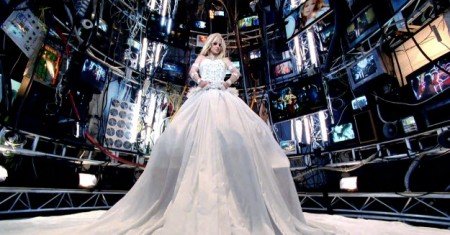
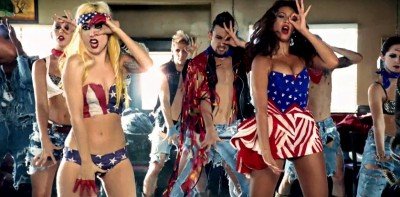
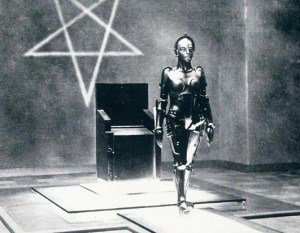
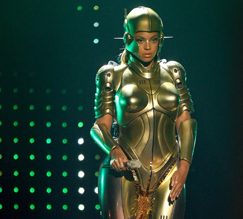
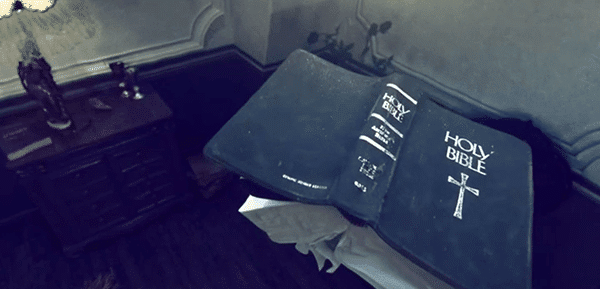
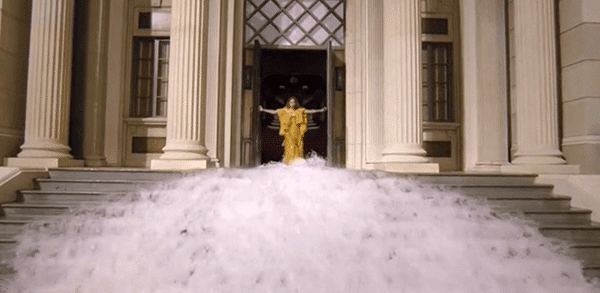
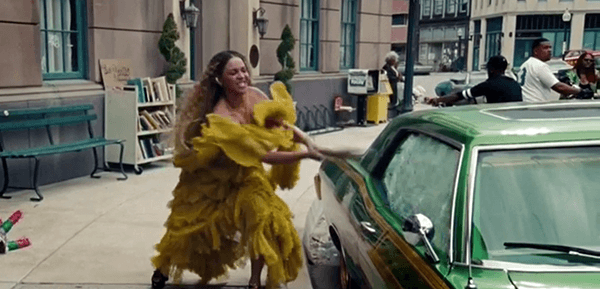
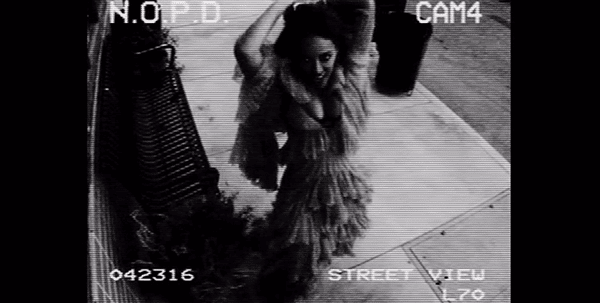

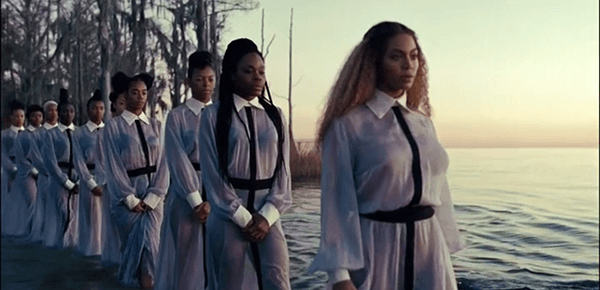
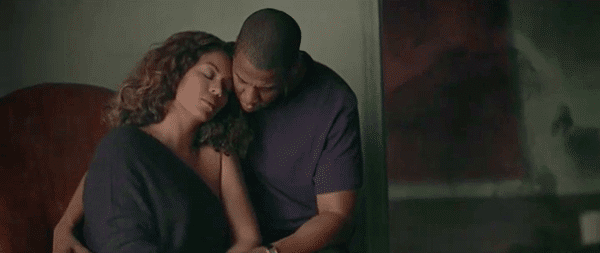
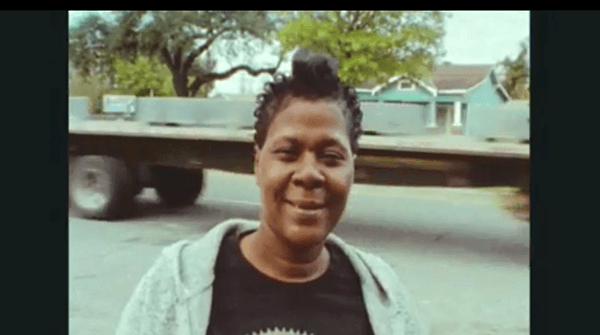
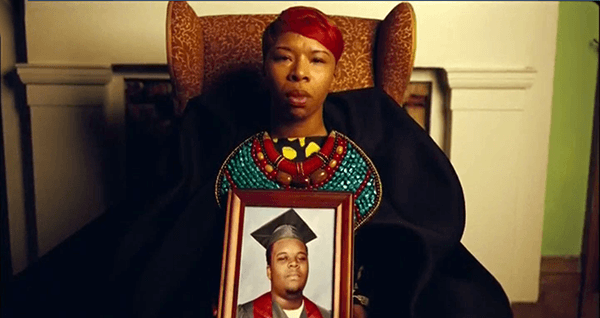

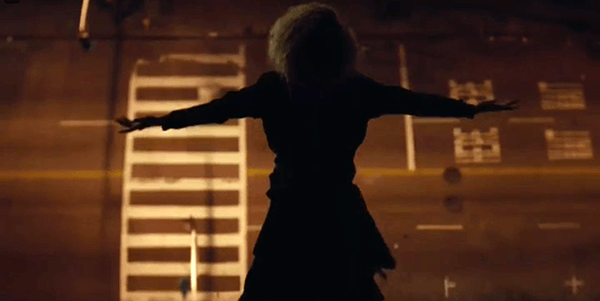
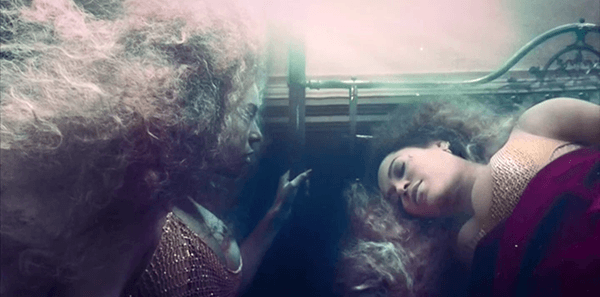
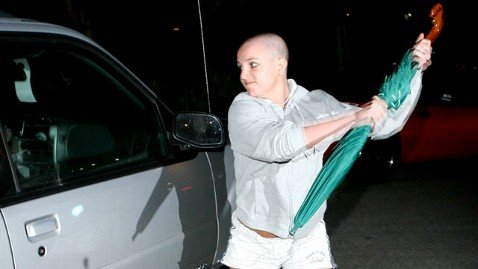











































No hay comentarios:
Publicar un comentario